These posts are from LinkedIn. Comprehensive and in descending order (latest first).
Creating software that we actually care about, is fun.
Creating software that we do not care about, is pain and misery (to say the least).
When do we care about software?
Usually, in two situations.
One, when we start it ourselves.
And two, when the person who started it and persons who worked on it thereafter, all cared about it.
Note to self :
Try to become a better engineer.
Good engineers are an asset to the world.
Unlike many other people, we are hardwired to look for solutions. We are solution-oriented. We make things happen.
We do not crib about how things ought to be. And we do not daydream our desired reality. We implement what is needed.
In all the nations, in all the fields, whatever impressive is being done, it is done by a team of good engineers.
It is our duty to be resourceful, to be keen, to be precise. And to do so, ever humbly, for the betterment of mankind.
Flooded with Studio Ghibli style images, many people have opined many things about the future of art.
We are faced with some fundamental questions about art itself.
Here is my answer.
Think about it.
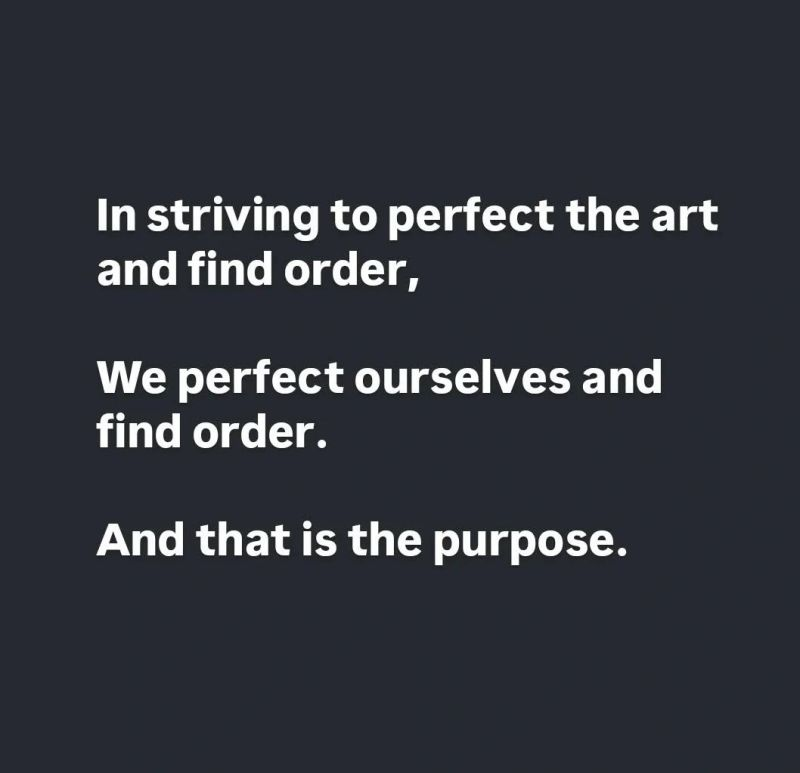
When you’re actively discomforted and passively contented, then you can know that you’re learning something.
There is really no end to gaining knowledge of any subject. It just goes deeper and deeper, becomes finer and finer, subtler and subtler.
But you see, there is nothing to be disheartened about not being able to ‘reach the end’. Actually there is no end. The extreme end of knowledge is perhaps आत्मज्ञान itself.
But for this worldly knowledge, the ideal goal is to purify our body and mind in the process of trying to gain the knowledge. And of course, the subject itself has some results of its own, which you may gladly experience.
Hence, the utility of all the worldly knowledge is to help us purify ourselves in the noble process of learning. Never expect that this knowledge will satisfy your inner desire for ‘all-knowledge’. Though this knowledge does help in purification, which in turn treads the path to self-knowledge.
So, I eagerly encourage you all to gain this worldly knowledge, as far and as wide as you can possibly have it, but with this subtle understanding as I’ve described above.
Somehow, I always find the most interesting books. 😄
The worrying part, though, is that neither do I seem to be becoming a trikāladarshi, nor understanding this dynamic programming.
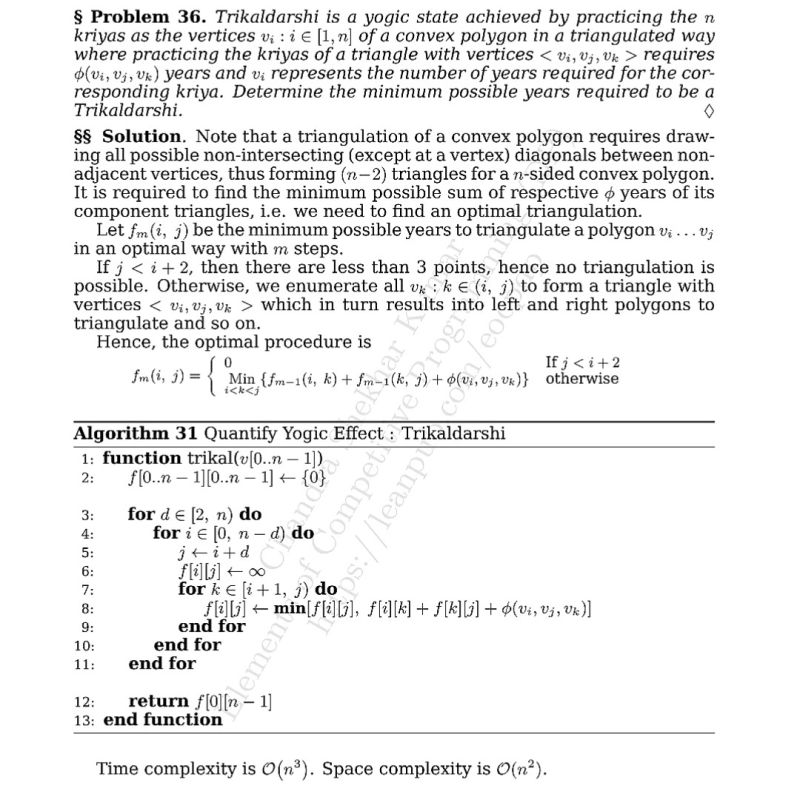
What Buddha said on matters of philosophy.
A Critical Survey of Indian Philosophy, Chandradhar Sharma, p. 58.
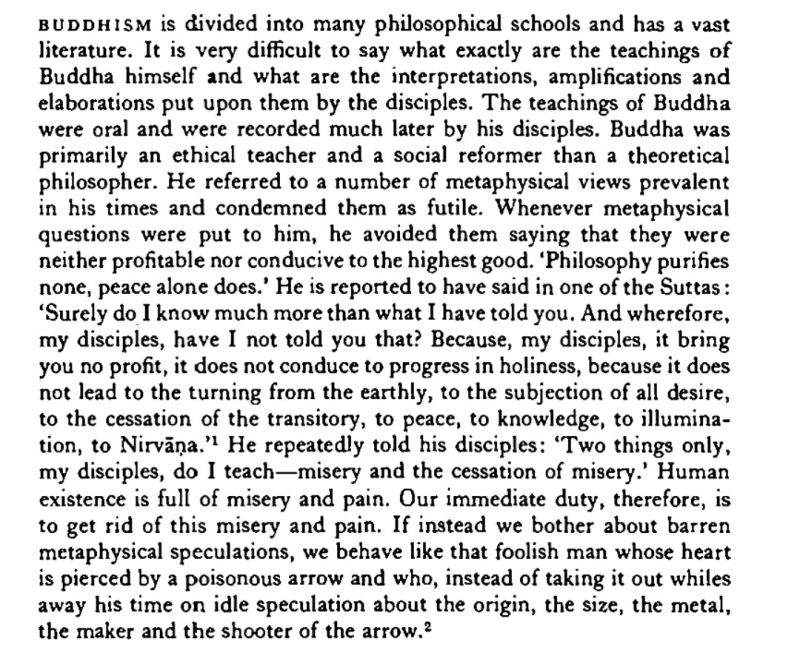
Thoughts #6
-
The greatest harm one can do unto himself is to lose self-respect. Nothing is valuable enough in the whole world so as to lose self-respect.
-
You know yourself better than anyone else. Therefore, you are the right person to carve the way for you.
-
The standard solution will produce standard results. Things of brilliance are not made on assembly lines, they need to be hand carved.
-
‘Let justice be done though the heavens fall’.
-
The sooner you realize your life is your own making, the better.
We should leave the consciousness thing to the philosophers. It’s an age old problem which falls into metaphysics more so than anything else.
What AI can definitely do, is to try imitate a conscious entity. The imitation can be so good that practically it would not matter whether it is really conscious or not.
Skills or talent or knowledge or designations should not be a factor in our giving respect to a fellow human.
What you consider skills today had no relevance a century ago. So were the people of old useless?
Knowledge is ever growing for the humankind, by means of research, curiosity and innovation.
No one can claim to know anything completely. The more you know, the more there is to learn.
The established social and professional structures often make us belittle human dignity. We should be careful to not fall into this trap.
When there is a natural disaster, suddenly all our made up bubbles break, and we see a human as human. This is how it should be in routine life too.
The best way to learn poetry?
Read and experience the good poetry already written.
The best way to learn music?
Listen with the heart and mind the good music already sung/played.
The best way to learn chess?
Read the analysis of the professional games already played.
And so on..
So, the best way to learn code seems to be reading the already written good code.
Note - I understand there are ‘technicalities’ which ought to be studied before we do this type of learning. But these ‘technicalities’ have never been the problem in the first place. What is difficult to grasp is the ‘real performance’ (which greatly differs from the technicalities even though it is based on them).
Time machine?
Old books, you mean.
I’ve seen brilliant people from a non-technical background, that are otherwise very logical and resourceful, but as soon as it comes to tech, they take the back seat.
I always felt that if they knew just enough tech, they could make the tech people be on their toes.
And this is just the book for this purpose.
Around 460 pages, a weekend read that could prove really beneficial.
And if you do not understand anything, send me a text.
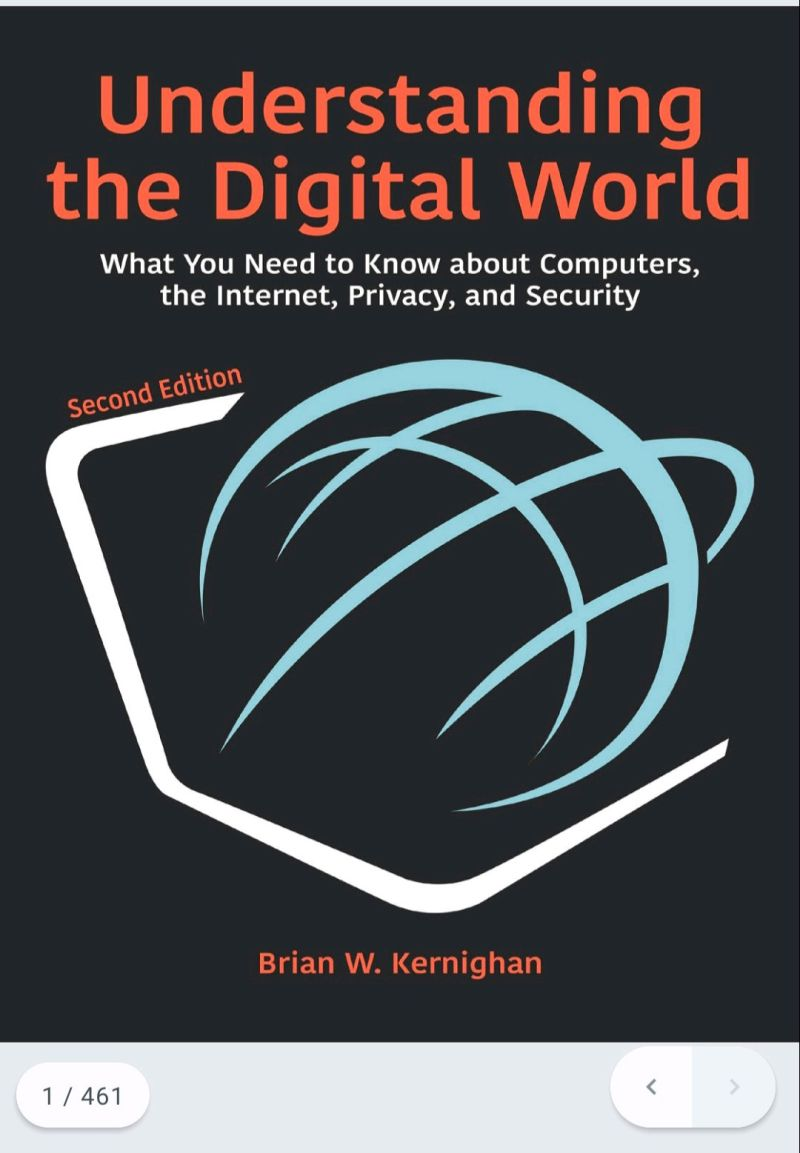
If you’re open, you’re vulnerable. If you’re closed, you’re not vulnerable.
To be open or closed?
Unfortunately, the mean among us makes it difficult to be open. And with one or two instances, people decide to become closed.
But the downside, what I feel, is that all creative power in all its manifestations is a consequence of being open and vulnerable.
If you become closed, you may be safe. But at what price?
So, my final advice is to be open and vulnerable. If you sense meanness, make a distance. But we cannot kill our roses because of these few weeds.
P.S. This post may be taken as social, professional, psychological or even spiritual.
One of the best things about making computer programs is that you have to get it right just once.
And then you can just sit back, and enjoy the fruits of your creation.
At least that is how it was meant to be, before big money made it too serious.
“To me the very essence of education is concentration of mind, not the collecting of facts. If I had to do my education over again, and had any voice in the matter, I would not study facts at all. I would develop the power of concentration and detachment, and then with a perfect instrument I could collect facts at will.”
~ Swami Vivekananda
Reading the books of pioneers of a field is such a raw experience.
It feels like learning it as a young boy from the grand old masters. In the lap of legends, one begins to feel intimacy with the field.
It creates a sense of belonging, and a sense of ‘ancestors’ belonging to the field.
And without this, who can dream to invent and innovate?
Interesting.
I personally very much like the idea of a single source of truth. But never thought it’s scalable to this extent.
Why Google Stores Billions of Lines of Code in a Single Repository
While having a conversation with a school kid recently, I noticed how the physics book defines the unit of metre.
Here’s what it says - ‘the metre is the length of the path traveled by light in a vacuum during a time interval of 1/299,792,458 of a second’.
Btw, if you’re wondering what a ‘second’ is then, here’s the definition - ‘the duration of 9,192,631,770 periods of the radiation corresponding to the transition between the two hyperfine levels of the ground state of the caesium-133 atom’.
I mean, whatever that means. But the point is, we want to use systems that are based on natural phenomena which are consistent, reproducible and non-conventional.
Why then, I ask, are we still using the inconsistent and illogical Gregorian calendar?
Thoughts #5
-
I think job satisfaction is more related to being highly proficient in our work, than salaries or other rewards.
-
It is said, work is not meant for getting fruits, work is meant for purification of the self. That is its real utility.
-
A person is definitely not born a ‘tabula rasa’ or ‘empty slate’. He has genetic memory from the parents, and karmic memory in his mind from previous lives.
-
Salaries are governed by various factors. A person makes brilliant software so he gets a lot of money. Another person makes brilliant pottery, but doesn’t get as much. It’s not just about skill or complexity, salaries are governed by market demand. So, the conclusion is, do not measure yourself by your salary, it’s not a good measure.
-
A small profit, scaled up, is a big profit. Because big profit individually is not so easy or certain, and so cannot be scaled up.
Thoughts #4
-
It’s somewhat challenging to come up with new meaningful thoughts every other day. And especially on LinkedIn.
-
If you are surrounded by fools for too long, you’re a fool too to let that happen.
-
The best thing money can afford, is time.
-
Some things require simple repetitions, and some things require deep study. And mistaking one for the other costs us precious time with no success.
-
The ‘posts’ or ‘designations’ in professional life become a deep sense of identity for most people.
Thoughts #3
-
Verily, the ability to strive for a delayed fruit is what decides our success more than anything else.
-
Mind is like a child, it will learn whatever ways you teach it.
-
The conscious mind is indeed the surface of the ocean. Some mysterious deep learning is going on in the rest of the ocean.
-
When I read a mind boggling algorithm in a book, it seems to me as if the author is a tabla player who is giving out his ancestral traditional compositions in public. What excitement!
-
You may try 100 times but succeed only once. But it’s not bad if you only need to succeed once.
Thoughts #2
-
As far as intellectual tasks are concerned, an excellent team of 5 is much better than an average team of 50.
-
Learn and take notes. Revise. Try to apply. Try to see connections with other things. Revise again. Try to apply well. Clearly see connections with other things. Internalize the learning. Develop intuition.
-
It is a skill to keep ‘swallowing technical terms’ without understanding them totally, to reach the end of the teaching where every part of the puzzle finds its correct place and every term makes sense. Very useful skill.
-
To know a thing very well, first thing you should do is to stop making assumptions about it! Question everything. Start from the origin of things.
-
Practical example of a stack? How often we employ it while talking! But if it goes 3-4 levels up, most people forget to come back to the main theme. However, some people are very good at coming back to the main theme. Why? I think it is because of good memory and strong sense of purpose.
One of the thoughts that interests me time and again,
We have five senses - smell, taste, sight, touch and hearing.
We are able to record, transmit and re-play two of them - sound(hearing) and vision(sight).
Why not the other three?
साहित्यसङ्गीतकलाविहीनः साक्षात्पशुः पुच्छविषाणहीनः।
तृणं न खादन्नपि जीवमानः तद्भागधेयं परमं पशूनाम्॥
— श्री भर्तृहरि (Sage Bhartṛhari)
Translation:
जो साहित्य संगीत तथा कला से विहीन है वह तो साक्षात पशु है, बगैर पूंछ और सिंगो के ही सही। वह मनुष्य घास न खाते हुए भी जीता है, यह पशुओं का बड़ा भाग्य समझना चाहिए (अन्यथा उनका भोजन और कम करता)।
One cannot understand India, that is Bharat without studying its philosophy and culture.
Start with music! Dive into this ocean by knowing each person on this page. Knowing the person, knowing their art, one connects with the ancient knowledge-base passed on to us by our ancestors centuries after centuries!
Thoughts #1
-
A leader is one who can inspire his team to work passionately. Rest are all managers, at best.
-
‘Passion’ for work arises when the individual finds ‘meaning’ in the work. This ‘meaning’ is subjective and is based on the ‘value’ perceived by the individual of the work.
-
Working passionately with our heart, mind and body- all into it, we work with ‘intensity’. Whereas working without our heart and mind together, we work without this ‘intensity’.
-
The price you pay for not working with ‘intensity’ at your job for years and years, is that ‘non-intensity’ becomes your habit, which affects all areas of your life, not just professional life.
-
The exceptional leader will ignite passion in the hearts of people. If they don’t like the work itself, he will ignite passion for a goal to be achieved, or for a challenge. But this cannot be faked. The leader must have a fire burning within himself, only then can a spark be ignited in others.
Well, most people I’ve asked have told me they just despise LinkedIn.
They don’t want to open it. They are sick of all the fakery, cold messages/posts, and all the people so obsessed with professional life.
After 5 minutes of browsing LinkedIn, they’re basically irritated and depressed.
If you did not know ‘Nagpur’ is pronounced as नागपुर, how would you know it is not नगपुर or नागपूर or even नगपूर just by looking at ‘Nagpur’?
The Latin alphabet is not phonetic like the ब्राह्मी (brāhmī) alphabet (on which all indian scripts are based).
There is a transliteration scheme called IAST (International Alphabet of Sanskrit Transliteration) which can be used to write indic scripts in roman losslessly.
I think the Indian Government should have standardized this scheme at the time of Independence itself. Such is its importance. But alas, the majority still does not know or care about lossy romanization of indic scripts. They have just accepted it.
If it were in my hands, this is the first thing I would do. And then you could travel across the country and pronounce all the names correctly just by looking at its roman transliteration.
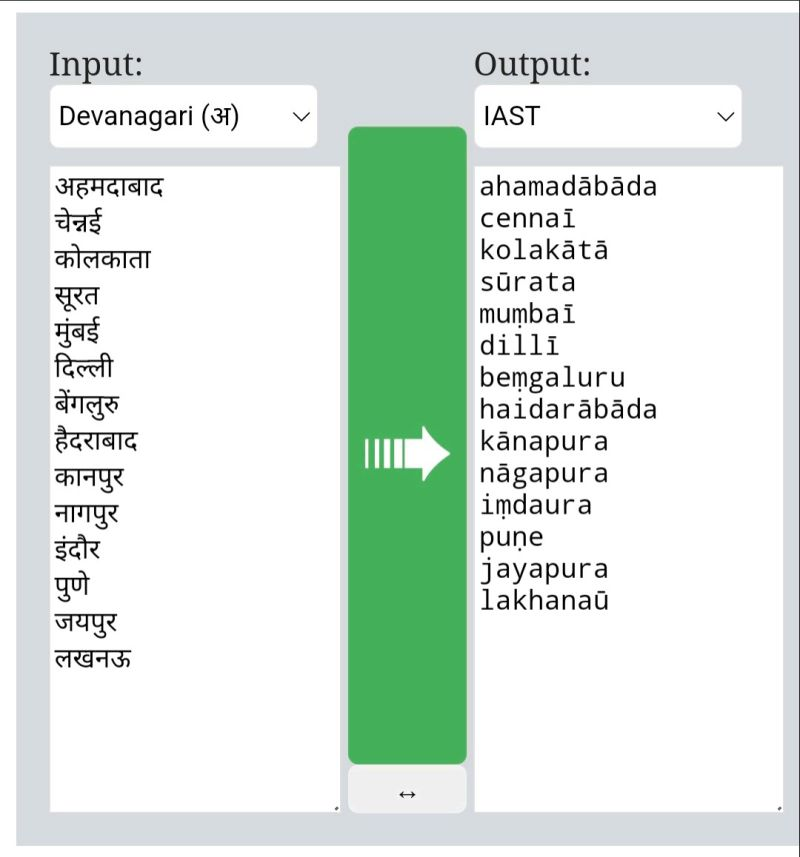
The concise yet comprehensive guide to learn Sanskrit.
Basically, there are two ways to learn a language. First, by acquisition. Second, by studying the grammar directly.
Most of the books or courses that teach a language mix up these two approaches. However, this guide only focuses on the second approach. So, no busy dull work. Direct to the point and crux of the matter.
Therefore, this guide is very effective in letting a layman enter into the world of Sanskrit grammar, without wasting time in any kind of practice or getting loaded with tons of technical terminology.
So, if you’re interested in learning Sanskrit grammar, and like to learn from written material, look no further.
If you want to understand music from the very basics, and more specifically Indian classical music, then read this exceptional research done by Dr. Vidyadhar Oke.
This is not about learning the music itself, but about what it is and how it works.
Do expect some strange mathematical ratios. Interestingly, that is how the universe works.
22shruti.com/research-topic-list
I’ve created a playlist of YouTube videos I’ve liked over many years. Mostly, it is related to classical music and spirituality. But you may also find discussions on civilizational issues, history, arts, culture etc.
This list is primarily useful to me only, to refer to the content I’ve liked before. But I hope that some person interested in these topics will find it as a great resource for exploration!
Mr. Stephen Wolfram writes very well. It is one thing to have knowledge and original ideas, but quite another to explain it all so well.
Will AIs Take All Our Jobs and End Human History—or Not? Well, It’s Complicated…